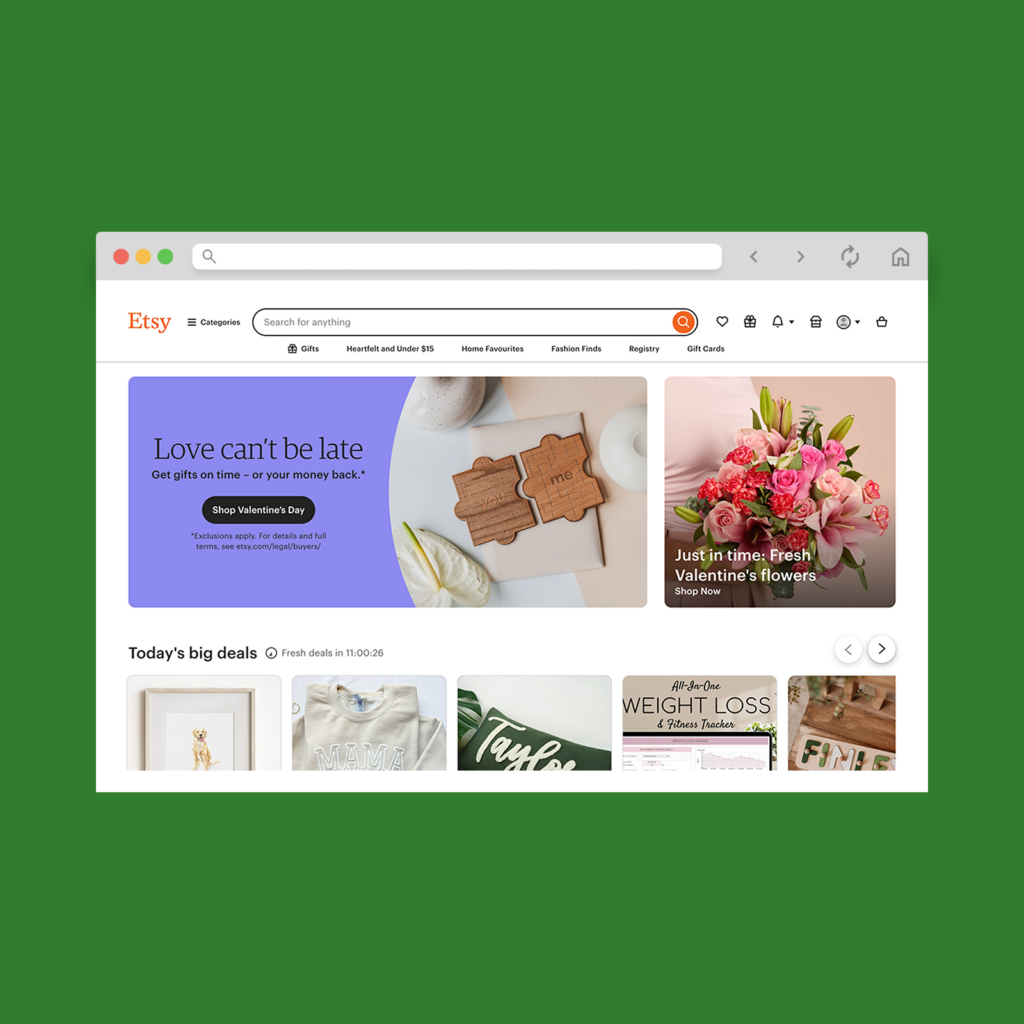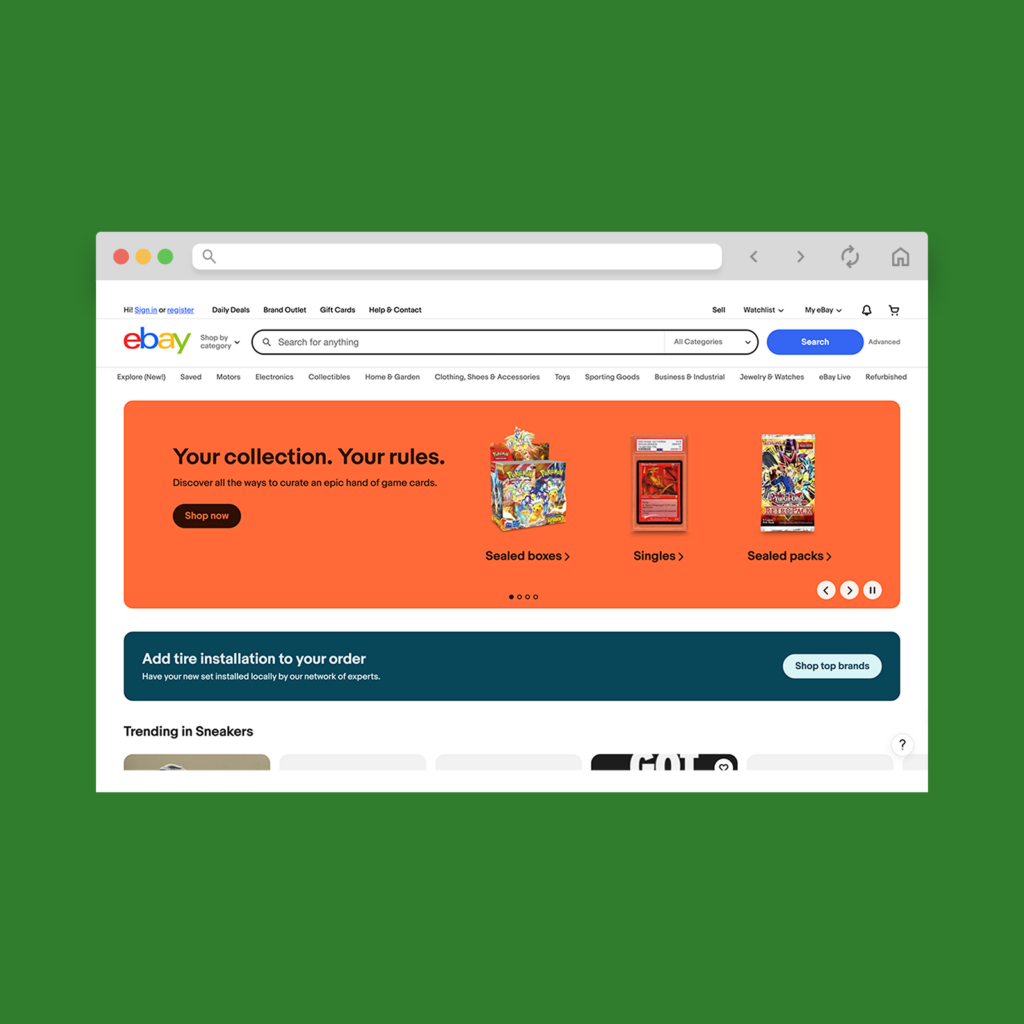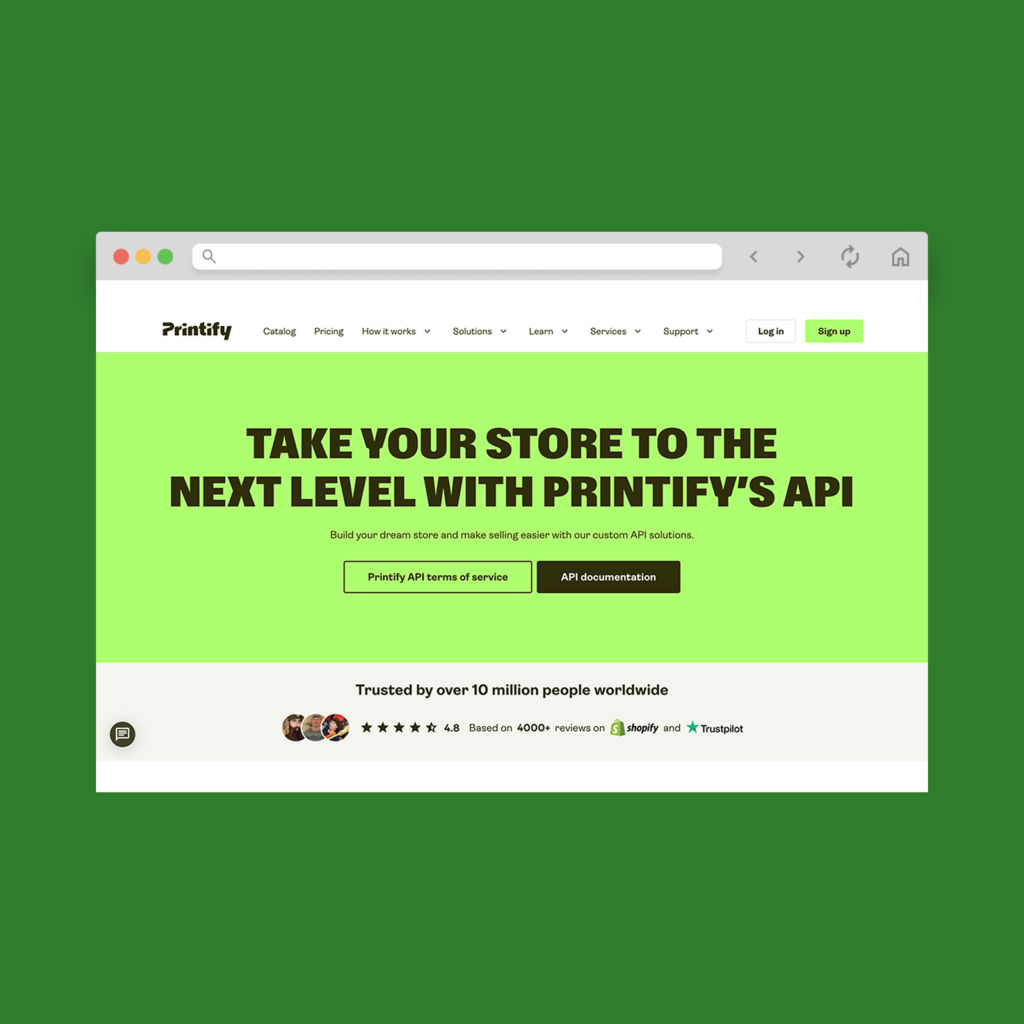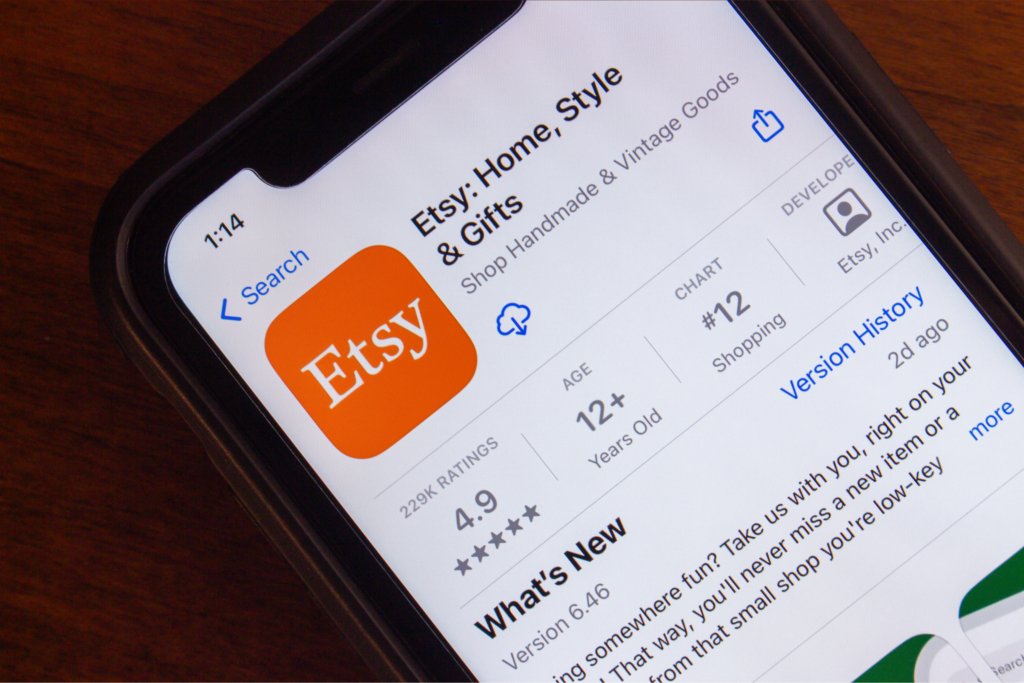Custom shirts, endless possibilities
Choosing the best place to sell t-shirts online can streamline your business. The right sales channel should be user-friendly, attract customers, increase sales, and maximize profits.
In this article, we’ll look at the best platforms for your online t-shirt business – carefully evaluate their advantages and disadvantages – and help you choose one that suits your business.
This post may contain affiliate links, which means we may earn a commission if you make a purchase through those links. This comes at no additional cost to you.
9 Best places to sell t-shirts online
Choosing the right eCommerce website can feel overwhelming, given the many options available.
Of the nine best sales channels we’ve picked, each platform and online marketplace has its own rules, advantages, and disadvantages. Consider your business goals to make the right decision.
Our print-on-demand (POD) order fulfillment service integrates with all these options, so you can start selling t-shirts without inventory or logisticalworries. Check out hundreds of product options and seamlessly publish your own custom t-shirts without any financial investment.
Etsy

Etsy is a trusted and well-loved eCommerce marketplace with a built-in audience. While it’s best known for handmade goods and vintage must-haves, selling custom t-shirts on Etsy is at the top of the marketplace’s best-selling categories.
Pros:
- Vast pre-existing traffic. Etsy is the go-to sales channel for extraordinary products, including apparel, wall art, prints, and more.
With over 96 million active buyers, thousands look for quality t-shirts. - Easy to set up. For an extensive app marketplace, Etsy is very beginner-friendly. If you’ve never had your own store, launching a t-shirt business on Etsy is a good start.
- Convenient marketing tools. The Etsy Ads feature runs ads inside the marketplace, letting you display your custom t-shirts in search results, categories, and market pages with a single campaign.
Cons:
- Etsy fees. Hosting an Etsy store is free, but it has transaction, shipping, payment processing fees, and upfront fees for setting up listings. While small, they add up. Here’s everything you need to know about Etsy fees.
- Intense competition. Many other shops are selling t-shirts online. If you choose Etsy, do everything you can to stand out: pick a niche, perfect your t-shirt design, and focus on marketing.
- Limited branding. Apart from the store’s banner and listing images, pretty much everything else on Etsy is standardized. Distinguishing yourself from others without your own website becomes challenging as your online shop grows.
Etsy is a great platform for just starting out and maintaining a smooth operation. If this sounds like a good fit for you, start with our in-depth guide on how to start an Etsy shop in seven steps.
As your business grows, consider creating additional sales channels for multichannel retailing to maintain your existing target audience while bringing your t-shirt designs to more customers.
Shopify

Shopify is an eCommerce platform that lets you build an online t-shirt store using pre-built templates, various customization options, and plug-ins for easy eCommerce management. It’s a platform worth considering as one of the best t-shirt-selling websites.
Pros:
- Easy to use. Shopify is a great choice to start selling online quickly. You don’t need any coding or design skills to represent your brand. The platform emphasizes full control over an intuitive eCommerce system and website management dashboard.
- Many themes. Shopify has various themes that you can easily apply, giving you the freedom to create an inviting, eye-catching, and modern storefront that can compete with established high-ranking t-shirt businesses.
- Apps and plug-ins. The Shopify App Store has thousands of apps, plug-ins, and community support features to optimize your online t-shirt business, including customer experience functionalities and analytics for sales and analyzing a targeted audience.
Cons:
- Operational costs. Shopify has three main pricing plans. While thefirst three months are $1/month, the full monthly cost afterward can cut into your profits if you’re just starting out.
- No pre-existing traffic. Unlike eCommerce marketplaces like Etsy, Amazon, or eBay, the traffic you get depends solely on your marketing skills. However, it offers social media integration, making it easier to connect with an existing audience.
- Transaction fees. If you choose a third-party payment solution instead of Shopify Payments, you’ll have to pay additional fees depending on your chosen Shopify plan. Find more information on the pricing page FAQ under Payment questions.
Here are some of the best Shopify t-shirt stores for your inspiration to see why t-shirt entrepreneurs love this platform.
Shopify is the best site to sell t-shirts if you want an intuitive system backed by a community of plug-in engineers. If this seems like the right platform for your custom products, our step-by-step guide on how to sell on Shopify will provide all the setup information.
eBay

As one of the oldest and largest eCommerce marketplaces, eBay is favored by buyers and t-shirt sellers alike. It’s one of the most convenient places where to sell shirts online for a business serving a global market.
Pros:
- Global reach. eBay’s international presence serves about 133 million active buyers worldwide, opening up endless opportunities to make money online. Expand a print-on-demand t-shirt business beyond local markets.
- Diverse audience. eBay provides a platform to attract t-shirt enthusiasts looking for specific designs, from pop culture references to limited-edition prints.
- Flexible selling options. eBay accommodates fixed-price listings and auction formats, allowing sellers to experiment with pricing strategies and appeal to different buyer preferences.
Cons:
- High competition. eBay’s large seller base means you’ll compete with many stores. When selling t-shirts online, standing out requires sharp branding, high-quality listings, and strategic marketing.
- Complex fee structure. Selling on eBay involves multiple fees, including insertion, final value, and listing fees for online stores. Explore eBay’s Selling fees page to avoid any confusion.
- Standardized policies. While eBay provides seller protections, it also enforces strict rules on returns and transactions, limiting your flexibility in managing your business.
If you want the best place to sell t-shirts online and make money, eBay is worth considering for your online store. To increase the likelihood of success, here are a few essential tips for selling on eBay and how to optimize a t-shirt printing business.
Wix

Wix is an intuitive online store builder, offering powerful features and solutions. It’s one of the most hands-on t-shirt selling platforms, letting you manage every aspect of your t-shirt business, from setting up a sales channel to designing your website visuals and interface.
Pros:
- Easy to customize. You don’t need any technical skills, and it’s perfect for beginners. Use the drag-and-drop editor to customize everything from the product page and shopping cart to integrating print-on-demand services for your custom products.
- Powerful features. Wix has built-in email and social marketing tools to expand your reach, so you can work within one system to start your promotional campaigns.
- Built-in SEO. The platform provides a strong technical Search Engine Optimization (SEO) infrastructure that helps optimize your online t-shirt store and grow organic traffic.
Cons:
- Free sites carry Wix branding. Your website domain will include “Wix” and Wix ads appear on every page in the URL. To remove these, you’ll need to upgrade your plan.
- No free site analytics. The easiest way to check your website’s performance is by using Google Analytics or similar tools. Sadly, you won’t be able to use these unless you upgrade your plan.
- Templates can’t be changed easily. When you’ve chosen your initial Wix template, you can’t switch to a different one. You can only change the design within the template. Or, create a new Wix site with a new one.
Wix competes well with other top places for selling t-shirts online. Carefully explore Wix’s Pricing informationto pick a plan that’s right for you.
Start selling today!
WooCommerce

WooCommerce is a plug-in for the free, open-source content management system (CMS) – WordPress. It can turn your WordPress website into a fully functional online t-shirt store.
Pros:
- Highly customizable. The WooCommerce Theme Store has a variety of paid themes, as well as free ones in the WordPress Theme directory.
- Variety of free and paid plug-ins. Find a bunch of plug-ins in the official WordPress Plug-in directory and WooCommerce Extension store.
- Marketing solutions. WooCommerce offers marketing solutions with social media, email marketing, promotions, and more.
Cons:
- Hosting costs. Unlike all-in-one platforms, WooCommerce requires separate hosting, which can vary in price depending on the provider and traffic volume.
- Requires technical expertise. Setting up and managing a WooCommerce store can be daunting for beginners, especially if you’re unfamiliar with WordPress.
- Lack of support for plug-ins. WooCommerce only supports its own products sold on its site. Every theme, plug-in, and hosting comes with different support channels.
If you already have a WordPress website and need a cost-effective solution that gives you complete control of your online store, WooCommerce is a great choice. You just need to be willing to overcome a steeper learning curve than the other options on this list.
Squarespace

Squarespace is a premium website builder tailored for businesses that value aesthetics and functionality. Its sleek, all-in-one platform is ideal for creating a professional store to showcase custom all-over-print t-shirts, regardless of technical abilities.
Pros:
- Industry-leading templates. Squarespace’s award-winning templates can create highly customized storefronts that highlight your t-shirts in a clean, professional layout.
- All-in-one platform. Squarespace handles hosting, security, and updates, letting you focus on running your business without technical distractions.
- Marketing integrations. Squarespace comes with built-in tools for email campaigns, social media integrations, and SEO, helping you attract customers directly to your store.
Cons:
- Customization limits. While Squarespace templates are visually impressive, they can be rigid, making advanced customization more difficult for users with unique needs.
- Cost structure. Squarespace charges additional fees for certain features, such as advanced eCommerce tools, on top of its subscription tiers, making it less budget-friendly for smaller operations.
- Limited extensions. With only 45 extensions, its app ecosystem isn’t as extensive as other platforms, which may hinder your customization efforts, marketing, and analytics.
If you don’t need many features and consider Squarespace’s iconic storefront aesthetic perfect as it is, it’s still a great platform for small print-on-demand businesses just starting out. Check out all Squarespace pricing plans, and pay only for what you need.
BigCommerce

BigCommerce is a robust eCommerce platform designed for online stores of all sizes. Known for its scalability and built-in tools, it’s a great option for t-shirt sellers looking to grow without too much technical knowledge.
Pros:
- Wide variety of features. BigCommerce has a built-in blog section, coupon, discount, and gift card options, reporting tools, and various resources for eCommerce growth.
- No additional transaction fees. Regardless of the plan you choose, BigCommerce won’t charge you additional payment processing fees, keeping profit margins high.
- World-class marketing solutions. In addition to third-party apps, BigCommerce offers a wide variety of built-in marketing features and multiple ways to offer free shipping.
Cons:
- Higher pricing tiers. Monthly costs can increase significantly as your revenue grows, especially for enterprise-level plans.
- Limited free themes. Although customizable, their selection of 12 free themes is smaller compared to competitors, requiring extra investment for premium designs.
- Premium features. Options like the abandoned cart saving feature aren’t included in the Standard Plan, which can push you to upgrade to higher-tiered plans.
BigCommerce is a great choice with many built-in features you’d have to pay for elsewhere. When looking for the best platform for selling custom t-shirts, BigCommerce is worth your consideration. It offers four paid plans with various thresholds depending on store growth.
PrestaShop

PrestaShop is an open-source, self-hosted eCommerce solution that can help you create, manage, and design an online shop. It’s well-suited for t-shirt merchants who want a lot of control over their online store’s design and functionality.
Pros:
- Rich in features. The official PrestaShop Add-Ons Marketplace has modules and templates you can use to customize your store’s appearance, increase traffic, and build customer loyalty.
- Useful marketing tools. Easily boost marketing efforts with SEO optimization, email marketing, and coupons. With PrestaShop Metrics, improve efficiency and profitability.
- Various payment solutions. The platform offers more than 100 payment solutions, including its own module – PrestaShop Checkout – that manages all types of payments for a cost.
Cons:
- Requires more expertise. PrestaShop is easy to use when running a store, but the installation and setup might require a more involved and technical process.
- Expensive add-ons. PrestaShop offers a wide variety of paid add-ons, and the costs can add up quickly if you want to use the platform to its fullest potential.
- Limited scalability. If you’re just starting, it’s not an issue, but to scale further, you might need a professional developer’s help.
While PrestaShop is free, the costs associated with running your own shop online, such as domain name, hosting provider, payment solutions, and any additional function a full-fledged store needs, must also be considered. However, it strikes a balance with its scope of features.
Printify API

API stands for an application programming interface. It lets you connect an application’s data and functionalities as an external third-party developer. In our case, developers can create automation on their own website without needing an eCommerce host.
The Printify API lets you develop custom functions, automate your workflow, and save time on repetitive tasks. It’s great for both individual merchants with their own stores and businesses with coding experience and resources to run a self-maintaining operation.
Pros:
- Seamless integration. The Printify API can be integrated into your own custom-built website or app, or become a part of other third-party solutions. In addition, you can keep developing on top of it.
- Highly customizable. Enhance the power of your website or platform by developing custom functions.
- Time-saving automation. If you need to add a large volume of products to your store, the Printify API can help you automate previously labor-intensive processes.
- Scalable and ready for growth. If you’re an existing business, you can employ automated processes to manage multiple orders faster and more efficiently.
- Developer solution. If you have the software developer skills or professional help necessary to use it, the Printify API is the best option for full eCommerce control.
Sell custom t-shirts online with Printify

Ready to start selling custom print-on-demand products? Follow these simple steps to launch your custom t-shirt business, seamlessly sync your products, and automate order fulfillment.
1. Sign up
Create a free Printify account in minutes to get started.
2. Choose your t-shirts
Explore the Printify Catalog to find high-quality t-shirts that suit your brand. Ranging in sizes, materials, neck types, fits, and printing methods, we have something for every need and style.
3. Apply your design
Upload or create your design with Printify’s easy-to-use Product Creator. Generate mockups to showcase online.
4. Decide where to sell
Connect your storeto any of the platforms on our list, and find other integration options.
5. Let Printify work
Our network of providers handles production and shipping while you focus on growing your business.
FAQ
The best website depends on your goals. Marketplaces like Etsy and eBay offer a built-in audience, while Shopify and WooCommerce give more control over branding and scalability. Carefully weigh hosting and transaction fees, and consider marketing and analytics tools.
Yes, the custom t-shirt market is expected to grow in revenue over the decade. Focus on trending niches, quality designs, and strategic pricing, and plan your overheads based on associated production and sales platform costs to maintain positive profit margins.
Etsy is a great option for sellers targeting a craft-loving audience. With over 96 million active buyers, it provides high visibility. Success requires niche targeting, standout designs, and effective marketing. If you factor Etsy fees into your pricing strategy, it’s a worthwhile choice.
Selling t-shirts successfully requires a mix of creativity, strategy, and execution:
- Identify a niche and create designs that resonate with your audience.
- Choose from the right eCommerce platforms or online marketplaces.
- Optimize your listings with clear descriptions and professional visuals.
- Market your t-shirts effectively through social media, SEO, and email campaigns.
- Use print-on-demand platforms like Printify to streamline production and minimize upfront costs.
Closing thoughts about the best websites to sell t-shirts online
With so many front-runners in eCommerce, each offers competitive features and distinct management systems based on technical know-how and the type of audience required.
The more you know, the better, and the more sales you’ll make. In addition to the features already explored, consider Printify as your go-to choice for t-shirt printing and order fulfillment.












